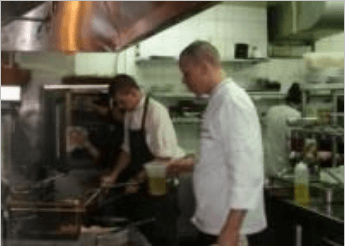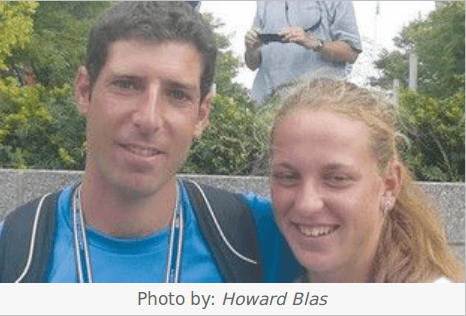Original Article On The Jerusalem Post
Currently ranked 708 in the world for singles and 848 for doubles, Valeria Patiuk is the youngest player on Israel’s Fed Cup team.
NEW YORK It is hard to resist the comparisons between Valeria Patiuk and her idol, Shahar Peer.
Both are hard-hitting tennis players who grew up on the courts of the Israel Tennis Centers, and both reached their first professional final at the age of 15 Peer in 2002, and Patiuk earlier this year in Ra’anana, at an Israel Tennis Federation tournament.
Shahar is my role model. She is a fighter, she plays with her heart and soul, and she does a good job representing Israel, noted Patiuk, at a pre-US Open match interview, in front of Arthur Ashe Stadium at the USTA Billie Jean King National Tennis Center in Flushing Meadows, Queens, New York.
The 15-year-old Patiuk, known as Lera, earned a spot in the juniors tournament after winning two matches in this week’s qualifying tournament.
The number 16 seed defeated Katrine Steffensen of the United States 6-3, 4- 6, 7-5, and Natalia Maynettoof the United States 6-2, 6-4.
After earning her spot in the main draw, Patiuk scored a 6-4, 6-3 win over Ukraine’s Ganna Poznikhirenko on Monday before facing Grace Min of the US late Tuesday night.
Patiuk, born in the Ukraine, moved to Israel at age one, and has been playing tennis since age six. She trains daily in Ramat Hasharon as part of the Elite Program of the Israel Tennis Centers.
Currently ranked 708 in the world for singles and 848 for doubles, she’s the youngest player on Israel’s Fed Cup team, where she plays with Pe’er.
Lera is a unique young lady, said Asaf Yamin, Patiuk’s coach for the past year. She is dedicated, likes to practice, and she is open.
I hope she can keep her character on the court. She is serious, and intense, and enjoys what she does.
Everybody compares Lera to Shahar on a daily basis, he added. Shahar is a good role model, but Lera has to focus on Lera and keep progressing. I hope she’ll have a career similar to Shahar’s.
Yamin is delighted that three Israelis have qualified for the main juniors draw: Patiuk, Or Ram-Harel and Bar Botzer.
It has been more than ten years since three Israelis have made it into the main juniors draw, noted Yamin.
All three will also play in the junior doubles tournament.
A fourth Israeli, Daniel Skripnik lost to Brazilian Karue Sell 7-6, 6-1 in his first-round qualifying match.
Danny Gelley, CEO of Israel Tennis Centers, is similarly pleased.
We are very proud and happy with the progress of our top juniors this year, Gelley said. The long and winding road to the top is paved by thousands of grueling hours in the sun, on the court and in the gym. I take my hat off to the players and their dedicated coaches for this milestone success and look forward to many more good things which I am sure are going to happen.
All three Israelis played their first round singles matches Monday, on court 15.
In the first match of the day, Ram-Harel, a 16-year-old right-handed player from Haifa, defeated Dennis Novak of Austria 7-6, 3-6, 6-3.
The trainer was called to attend to Ram-Harel in both the first and second sets.
My body was hurting, Ram-Harel said. I had cramps in my legs, and my head felt like it was spinning.
The three hour, ten minute match took place under very hot, humid midday conditions, and Ram- Harel playing in his first Grand Slam event appreciated the support and chants of the pro-Israeli crowd.
He played Joao Pedro Sorgi of Brazil (the 14th seed) in the second round on Tuesday.
Coach Yamin describes Ram-Harel as a big fighter with good court presence. He plays every point with his heart.
Yamin is impressed that he is already in the main draw at age 16, still with two years of junior eligibility left.
Yamin, who is traveling with and supervising all four players while in New York, coached the 17-year-old Bar Botzer when he was 13.
Botzer is very unique and very mature, Yamin said. He is always improving and has great potential.
Botzer squandered a firstset win in his first round match against Kaichi Uchida of Japan, and Uchida went on to win 4-6, 6-4, 6-2.
Today I lost because my biggest weapon, my serve, didn’t work, Botzer said.
At the conclusion of the Botzer match, Lera Patiuk took the court against Poznikhirenko.
Patiuk experienced abdominal pain while up 5- 4 in the first set, but went on to win 6-4, 6-3.
I served very well today. My serve was the key for the match, reported Patiuk. I have had pain in my stomach muscles for the past two weeks. It is getting better day by day, but I felt stomach pain while serving.
The hard-hitting, grunting Patiuk gave herself encouragement through shouts of Come on! and Kadima! This is my first time playing in the US Open and my first Grand Slam, she says.
I think my two qualifying matches gave me confidence and I am beginning to believe in myself again.





